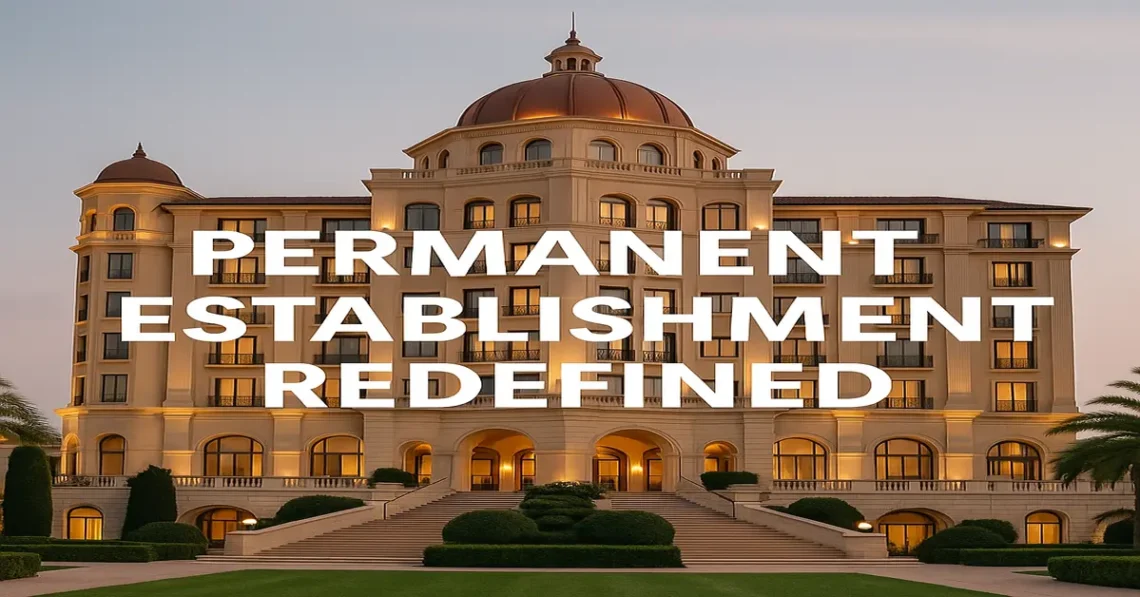Multinational enterprises often conduct business in foreign jurisdictions through Permanent Establishments (“PEs”)—a concept that holds significant relevance under the income tax laws of the host country. The primary objective behind this framework is to ensure that profits attributable to economic activities conducted within the source country are taxed there.
In recent years, global private equity and venture capital firms (“PE/VC”) have increasingly set up local advisory entities in India and other jurisdictions. These entities typically provide strategic, operational, and commercial support to portfolio companies or advise offshore fund managers. While such arrangements are commonly structured to avoid creating a taxable presence, the boundaries between advisory support and actual business conduct are often blurred.
Against this backdrop, the recent Supreme Court ruling in Hyatt International Southwest Asia Ltd. v. ADIT assumes critical importance. The Court has expanded the interpretation of a “fixed place” PE, holding that economic substance will override legal form when assessing whether a PE exists under a tax treaty.
This post analyses the Supreme Court’s reasoning in the Hyatt decision. It explores its potential implications for the structuring of PE/VC operations in India, particularly where offshore sponsors rely on Indian advisory or support entities that may now fall within the tax net.
Background of the Case
Hyatt International Southwest Asia Ltd. (Hyatt), a UAE-based company, entered into “Strategic Oversight Services Agreements” (‘SOSA’) with Indian hotel owners to provide strategic planning, branding, and management services for Hyatt-branded hotels in Delhi and Mumbai. These agreements were long-term (20 years), performance-linked, and involved periodic visits by Hyatt’s employees to India.
Under the SOSA, Hyatt was charging service fees from Indian Hotel owners for the consultation services rendered. This fee was construed as taxable income by the Assessing Officer who was of the view that Indian hotels constituted PE under the Double Taxation Avoidance Agreement (“DTAA”) and the fee was thus taxable. However, Hyatt claimed its income from these agreements was not taxable in India because:
- It had no Permanent Establishment (PE) in India under Article 5 of the India–UAE DTAA.
- It performed services from Dubai and had no fixed office or branch in India.
- Its employees did not cross the 9-month physical presence threshold under Article 5(2)(i) of the DTAA.
This was appealed before the High Court who ruled in favour of the Assessing Officer and left the issue of determination of PE open for the apex court.
What is Permanent Establishment?
The concept of Permanent Establishment (PE) is central to international taxation, and is generally defined as a “fixed place of business through which the business of an enterprise is wholly or partly carried on.” In the Indian legal framework, the concept is governed by both the Income-tax Act, 1961 and the DTAAs entered into with other countries. Most of these treaties draw from the OECD Model Tax Convention, which provides the definitional and interpretive basis for determining the existence of a PE.
Traditionally, this definition has been interpreted to imply the need for a physical and identifiable location within India. In E-Funds IT Solutions Inc., the Supreme Court emphasized that for a PE to exist, there must be a fixed place at the disposal of the foreign enterprise, and that mere back-office support by an Indian affiliate would not suffice.
However, in Formula One World Championship Ltd. v. CIT, the Court adopted a more expansive view. It held that ownership or lease of the premises is not necessary; what is material is whether the foreign entity has a right to use and exercise control over the premises through which business is conducted. The decision signaled a shift from a narrow interpretation of physical presence toward a more substance-oriented approach, laying the groundwork for the principles reaffirmed in Hyatt.
Supreme Court’s Observations in Hyatt International
In its ruling, the Supreme Court undertook a detailed analysis of the nature of Hyatt International’s role under the Strategic Oversight Services Agreement (SOSA), and laid down critical observations that expand the interpretation of a “fixed place” Permanent Establishment in the context of service-oriented cross-border arrangements. The key takeaways from the Court’s reasoning are as follows:
- Distinction Between Trading and Service-Oriented Enterprises
The Court acknowledged that the test for determining a fixed place PE may differ based on the nature of the business. In service-oriented enterprises, the requirement for continuous physical presence may not be as rigid as in trading or manufacturing entities, due to the inherently mobile and non-tangible nature of services. Therefore, the existence of a PE must be assessed through a fact-specific inquiry, taking into account the manner and degree of business operations carried out in India.
- Pervasive Control and Active Participation by Hyatt
Under the SOSA, the Court found that Hyatt International exercised comprehensive and enforceable control over the strategic, operational, and financial decision-making of the Indian hotels. This included the authority to:
- Appoint and supervise the General Manager and Executive Committee members;
- Implement global human resource and procurement policies;
- Control pricing, branding, and marketing strategies; and
- Station personnel in India must have prior approval from the hotel owner.
The Court concluded that these powers far exceeded the scope of a mere consultancy arrangement. Hyatt was, in substance, an active participant in the core affairs of the hotel business in India.
- Economic Substance Prevails Over Legal Form
Reinforcing the principle laid down in earlier decisions, the Court emphasized that the legal form of an arrangement cannot override its economic substance when determining the existence of a Permanent Establishment. Even in the absence of formal ownership or a registered office in India, if the foreign enterprise exercises effective control and carries on its business through a fixed location, a PE may be deemed to exist.
Track Deal Comments
The Supreme Court’s ruling in Hyatt International reinforces the principle that economic substance must prevail over mere contractual form. This has significant implications for the Indian private equity and venture capital industry, particularly in areas where the legal characterization of income or structure has traditionally been used to mitigate tax exposure.
One such area is the tax treatment of carried interest. Under prevailing Indian tax practice, carried interest—typically paid to fund managers for achieving superior returns—is treated as a capital gain, resulting in a comparatively lower tax burden. However, in ICICI Econet Venture Fund v. DCIT, the Bangalore Income Tax Appellate Tribunal (ITAT) examined the underlying economic reality of carried interest. The Tribunal held that because the carried interest was contingent upon the performance of the fund and effectively functioned as remuneration for fund management services, it bore the characteristics of a service fee, not an investment return.
The Supreme Court’s affirmation in Hyatt that substance should govern the PE analysis, and that contractual labels must not obscure commercial reality, may lend support to the reasoning adopted in ICICI Econet Venture Fund. If this interpretive shift continues, it could open the door to recharacterizing carried interest as performance-linked compensation, potentially attracting Goods and Services Tax (GST) and subjecting it to taxation as business income, especially where Indian fund managers or advisory arms are involved.
A parallel concern arises in the context of offshore PE firms and their Indian advisory subsidiaries. In early 2025, Indian tax authorities issued detailed questionnaires to several foreign PE sponsors and their Indian affiliates, seeking clarity on the split of carried interest or performance-linked fees between the fund and the Indian entity. The underlying concern was that if the local entity plays an active role in fund performance and fee generation, the offshore sponsor may be deemed to have a “fixed place” Permanent Establishment in India.
Where such agreements grant the foreign sponsor access to Indian facilities, personnel, or decision-making infrastructure, even without formal ownership or tenancy rights, the Hyatt ruling increases the likelihood of these arrangements being recharacterized as PE-creating for Indian tax purposes. As such, fund managers and sponsors must now exercise heightened diligence in reviewing both their internal fee-sharing structures and their inter-entity service agreements to ensure that the form and substance align, and that they do not inadvertently trigger domestic tax exposure under Article 7 of applicable DTAAs.
Conclusion
The Supreme Court’s Hyatt ruling widens the interpretation of “fixed place PE” and strengthens India’s taxing rights over foreign entities that exert control over Indian operations—even without a formal office. PE and VC investors with advisory or strategic oversight roles in Indian portfolio companies must carefully revisit their structures and contractual arrangements to avoid unexpected tax exposure in India.
Pages: 1 2






